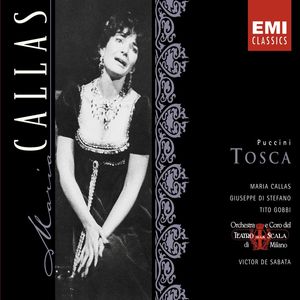
Tosca
composed by Giacomo Puccini, 1858-1924; conducted by Victor De Sabata, 1892-1967; produced by Walter Legge; performed by Giuseppe di Stefano, Maria Callas, 1923-1977 and Tito Gobbi, 1913-1984, Orchestra of the Teatro alla Scala and Chorus of the Teatro alla Scala (Warner Music, 2005), 1 hour 52 mins
Details
- Field of Interest
- Classical Music
- Composer
- Giacomo Puccini, 1858-1924
- Conductor
- Victor De Sabata, 1892-1967
- Content Type
- Music recording
- Duration
- 1 hour 52 mins
- Recording Engineer
- Robert Beckett
- Ensemble
- Orchestra of the Teatro alla Scala, Chorus of the Teatro alla Scala
- Format
- Audio
- Sub Genre
- Opera
- Label
- Warner Music
- Performer
- Giuseppe di Stefano, Maria Callas, 1923-1977, Tito Gobbi, 1913-1984
- UPC (Physical)
- 724355630421
- Producer
- Walter Legge
- Date Recorded
- 1953
- Release Date
- 2005-11-28
- Review
- EMI's 1980 recording of Tosca has many strengths, not the least of which is the brilliant and incisive conducting of James Levine. He leads the Philharmonia Orchestra in a stellar performance that allows details of orchestration to emerge with great clarity. His emphasis on the score's many dramatic contrasts and mercurial moods highlights the opera's character as a psychological thriller, and his rhythmic suppleness give it a surging romantic power. Plácido Domingo is a refined but passionate {%Cavaradossi}. He was at the height of his powers when the recording was made, and his top is thrillingly ringing. Renato Bruson's {%Scarpia} is strong, but his voice lacks the unctuous darkness that makes for a truly frightening portrayal of evil. As {%Tosca}, Renata Scotto was past her prime when the recording was made, and she is occasionally betrayed by a wobble. A somewhat older {%Tosca}, however, is a reasonable dramatic conceit, and the fact that her character is so often enraged makes Scotto's lack of absolute control in the more fiery passages forgivable. In "Vissi d'arte," her moment of relatively quiet reflection, Scotto is highly effective; she fully exploits her gifts in portraying a sympathetic victim that make her 1966 Madama Butterfly so extraordinary. A listener's response to Scotto's {%Tosca} will probably hinge on the acceptance of her occasional lack of vocal control as an expression of her temperament and her emotional distress. The smaller roles are vividly characterized by singers with consistently strong voices; in particular, Andrea Velis' {%Spoletta} is deliciously unpleasant. This might not be the first choice for the listener looking for only one version of the opera, since Bruson's {%Scarpia} doesn't fully exploit the character's malevolence, and Scotto's {%Tosca} is not always lyrically sumptuous, but Domingo's performance, the fine supporting cast, and Levine's illuminating reading make this a version that should be of interest to Puccini enthusiasts. ~ Stephen Eddins, All Music Guide
- Subject
- Classical Music, Music & Performing Arts, Romantic, Romanticismo, Romantica, Romantic
- Keywords and Translated Subjects
- Romanticismo, Romantica
